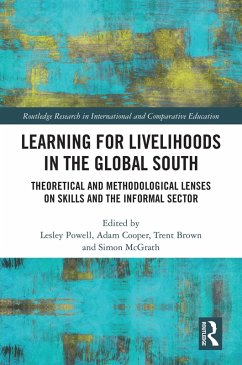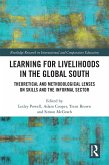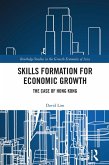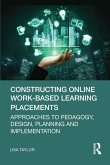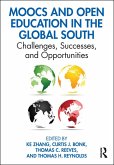Learning for Livelihoods in the Global South (eBook, PDF)
Theoretical and Methodological Lenses on Skills and the Informal Sector
Redaktion: Powell, Lesley; Mcgrath, Simon; Brown, Trent; Cooper, Adam
42,95 €
42,95 €
inkl. MwSt.
Sofort per Download lieferbar

21 °P sammeln
42,95 €
Als Download kaufen

42,95 €
inkl. MwSt.
Sofort per Download lieferbar

21 °P sammeln
Jetzt verschenken
Alle Infos zum eBook verschenken
42,95 €
inkl. MwSt.
Sofort per Download lieferbar
Alle Infos zum eBook verschenken

21 °P sammeln
Learning for Livelihoods in the Global South (eBook, PDF)
Theoretical and Methodological Lenses on Skills and the Informal Sector
Redaktion: Powell, Lesley; Mcgrath, Simon; Brown, Trent; Cooper, Adam
- Format: PDF
- Merkliste
- Auf die Merkliste
- Bewerten Bewerten
- Teilen
- Produkt teilen
- Produkterinnerung
- Produkterinnerung

Bitte loggen Sie sich zunächst in Ihr Kundenkonto ein oder registrieren Sie sich bei
bücher.de, um das eBook-Abo tolino select nutzen zu können.
Hier können Sie sich einloggen
Hier können Sie sich einloggen
Sie sind bereits eingeloggt. Klicken Sie auf 2. tolino select Abo, um fortzufahren.

Bitte loggen Sie sich zunächst in Ihr Kundenkonto ein oder registrieren Sie sich bei bücher.de, um das eBook-Abo tolino select nutzen zu können.
This edited volume explores how youth and informal sector workers in the global south are pioneering learning and livelihoods that exist at the intersections of, and beyond, the boundaries of the state, market, and other formal institutions.
- Geräte: PC
- mit Kopierschutz
- eBook Hilfe
- Größe: 4.13MB
Andere Kunden interessierten sich auch für
![Learning for Livelihoods in the Global South (eBook, ePUB) Learning for Livelihoods in the Global South (eBook, ePUB)]() Learning for Livelihoods in the Global South (eBook, ePUB)42,95 €
Learning for Livelihoods in the Global South (eBook, ePUB)42,95 €![Skills Formation for Economic Growth (eBook, PDF) Skills Formation for Economic Growth (eBook, PDF)]() David LimSkills Formation for Economic Growth (eBook, PDF)42,95 €
David LimSkills Formation for Economic Growth (eBook, PDF)42,95 €![Videogames and Education (eBook, PDF) Videogames and Education (eBook, PDF)]() Harry J. BrownVideogames and Education (eBook, PDF)46,95 €
Harry J. BrownVideogames and Education (eBook, PDF)46,95 €![Early Innovators in Adult Education (eBook, PDF) Early Innovators in Adult Education (eBook, PDF)]() Huey B. LongEarly Innovators in Adult Education (eBook, PDF)34,95 €
Huey B. LongEarly Innovators in Adult Education (eBook, PDF)34,95 €![Constructing Online Work-Based Learning Placements (eBook, PDF) Constructing Online Work-Based Learning Placements (eBook, PDF)]() Lisa TaylorConstructing Online Work-Based Learning Placements (eBook, PDF)31,95 €
Lisa TaylorConstructing Online Work-Based Learning Placements (eBook, PDF)31,95 €![MOOCs and Open Education in the Global South (eBook, PDF) MOOCs and Open Education in the Global South (eBook, PDF)]() MOOCs and Open Education in the Global South (eBook, PDF)45,95 €
MOOCs and Open Education in the Global South (eBook, PDF)45,95 €![Technical and Vocational Teaching in South Africa (eBook, PDF) Technical and Vocational Teaching in South Africa (eBook, PDF)]() Technical and Vocational Teaching in South Africa (eBook, PDF)129,95 €
Technical and Vocational Teaching in South Africa (eBook, PDF)129,95 €-
-
-
This edited volume explores how youth and informal sector workers in the global south are pioneering learning and livelihoods that exist at the intersections of, and beyond, the boundaries of the state, market, and other formal institutions.
Dieser Download kann aus rechtlichen Gründen nur mit Rechnungsadresse in A, B, BG, CY, CZ, D, DK, EW, E, FIN, F, GR, HR, H, IRL, I, LT, L, LR, M, NL, PL, P, R, S, SLO, SK ausgeliefert werden.
Produktdetails
- Produktdetails
- Verlag: Taylor & Francis eBooks
- Seitenzahl: 300
- Erscheinungstermin: 23. Dezember 2024
- Englisch
- ISBN-13: 9781040274255
- Artikelnr.: 72535292
- Verlag: Taylor & Francis eBooks
- Seitenzahl: 300
- Erscheinungstermin: 23. Dezember 2024
- Englisch
- ISBN-13: 9781040274255
- Artikelnr.: 72535292
- Herstellerkennzeichnung Die Herstellerinformationen sind derzeit nicht verfügbar.
Lesley Powell is Associate Professor in the School of Education at the University of Cape Town, South Africa. Adam Cooper is chief research specialist in the Equitable Education and Economies Research Division, Human Sciences Research Council of South Africa. Trent Brown is Associate Professor at Tokyo College at the University of Tokyo, Japan. Simon McGrath holds the established chair in Education at the University of Glasgow, UK.
Foreword
1. Skills, the informal sector and global south youth: theory and methods
to break the silence
PART 1. THEORISING: RETHINKING THE PURPOSE OF EDUCATION AND TRAINING
2. A relational capabilitarian approach for wellbeing livelihoods:
Reframing and making alternative education, skills and work for young
people
3. Subsumption, Alienation, and Questions of Meaning in Informal Sector
Skills Training
4. Supporting youth livelihoods in an informal "sub-field" in the global
south
PART 2. CONCEPTUALISING: CONCEPTUAL TOOLS FOR UNDERSTANDING INFORMAL SECTOR
SKILL ACQUISITION IN PRACTICE
5. Shifting informal geographies and the hustle for a better future
6. A typology of informal sector workers - heterogeneity and the complexity
of skills development responses
7. The potential role of ICT in facilitating learning for livelihoods among
informal apprentices in the automotive trade in Ghana
8. Highly educated migrants in platform-mediated food delivery work in the
Netherlands: The absent presence of skills and its social effects
PART 3. CRITIQUING: UNDERSTANDING CONSTRAINTS AND WEAKNESSES IN DOMINANT
APPROACHES
9. Exploring 'valuable' knowledge, skills and attitudes: Perceptions of
young people in an informal settlement in Pietermaritzburg
10. Critiquing the concept of 'self-reliance' in informal sector training:
A case study of Afghan refugee women in India
11. Gendering decent work: Rethinking the connections between informality,
TVET and gender through the 'Decent Work' agenda in Sierra Leone and
Cameroon
PART 4. ADVOCATING: TOWARDS REFORM OF POLICY AND PRACTICE
12. Financing Skills and Lifelong Learning in the Informal Sector
13. Exploring the intersectionality of green skills, innovation and
livelihoods in the informal economy in Harare, Zimbabwe
14. Recognising Colombian waste pickers as public service providers and
producers of knowledge
PART 5. CONCLUDING: MOVING FORWARD
15. Skill and livelihoods: some concluding ideas
1. Skills, the informal sector and global south youth: theory and methods
to break the silence
PART 1. THEORISING: RETHINKING THE PURPOSE OF EDUCATION AND TRAINING
2. A relational capabilitarian approach for wellbeing livelihoods:
Reframing and making alternative education, skills and work for young
people
3. Subsumption, Alienation, and Questions of Meaning in Informal Sector
Skills Training
4. Supporting youth livelihoods in an informal "sub-field" in the global
south
PART 2. CONCEPTUALISING: CONCEPTUAL TOOLS FOR UNDERSTANDING INFORMAL SECTOR
SKILL ACQUISITION IN PRACTICE
5. Shifting informal geographies and the hustle for a better future
6. A typology of informal sector workers - heterogeneity and the complexity
of skills development responses
7. The potential role of ICT in facilitating learning for livelihoods among
informal apprentices in the automotive trade in Ghana
8. Highly educated migrants in platform-mediated food delivery work in the
Netherlands: The absent presence of skills and its social effects
PART 3. CRITIQUING: UNDERSTANDING CONSTRAINTS AND WEAKNESSES IN DOMINANT
APPROACHES
9. Exploring 'valuable' knowledge, skills and attitudes: Perceptions of
young people in an informal settlement in Pietermaritzburg
10. Critiquing the concept of 'self-reliance' in informal sector training:
A case study of Afghan refugee women in India
11. Gendering decent work: Rethinking the connections between informality,
TVET and gender through the 'Decent Work' agenda in Sierra Leone and
Cameroon
PART 4. ADVOCATING: TOWARDS REFORM OF POLICY AND PRACTICE
12. Financing Skills and Lifelong Learning in the Informal Sector
13. Exploring the intersectionality of green skills, innovation and
livelihoods in the informal economy in Harare, Zimbabwe
14. Recognising Colombian waste pickers as public service providers and
producers of knowledge
PART 5. CONCLUDING: MOVING FORWARD
15. Skill and livelihoods: some concluding ideas
Foreword
1. Skills, the informal sector and global south youth: theory and methods
to break the silence
PART 1. THEORISING: RETHINKING THE PURPOSE OF EDUCATION AND TRAINING
2. A relational capabilitarian approach for wellbeing livelihoods:
Reframing and making alternative education, skills and work for young
people
3. Subsumption, Alienation, and Questions of Meaning in Informal Sector
Skills Training
4. Supporting youth livelihoods in an informal "sub-field" in the global
south
PART 2. CONCEPTUALISING: CONCEPTUAL TOOLS FOR UNDERSTANDING INFORMAL SECTOR
SKILL ACQUISITION IN PRACTICE
5. Shifting informal geographies and the hustle for a better future
6. A typology of informal sector workers - heterogeneity and the complexity
of skills development responses
7. The potential role of ICT in facilitating learning for livelihoods among
informal apprentices in the automotive trade in Ghana
8. Highly educated migrants in platform-mediated food delivery work in the
Netherlands: The absent presence of skills and its social effects
PART 3. CRITIQUING: UNDERSTANDING CONSTRAINTS AND WEAKNESSES IN DOMINANT
APPROACHES
9. Exploring 'valuable' knowledge, skills and attitudes: Perceptions of
young people in an informal settlement in Pietermaritzburg
10. Critiquing the concept of 'self-reliance' in informal sector training:
A case study of Afghan refugee women in India
11. Gendering decent work: Rethinking the connections between informality,
TVET and gender through the 'Decent Work' agenda in Sierra Leone and
Cameroon
PART 4. ADVOCATING: TOWARDS REFORM OF POLICY AND PRACTICE
12. Financing Skills and Lifelong Learning in the Informal Sector
13. Exploring the intersectionality of green skills, innovation and
livelihoods in the informal economy in Harare, Zimbabwe
14. Recognising Colombian waste pickers as public service providers and
producers of knowledge
PART 5. CONCLUDING: MOVING FORWARD
15. Skill and livelihoods: some concluding ideas
1. Skills, the informal sector and global south youth: theory and methods
to break the silence
PART 1. THEORISING: RETHINKING THE PURPOSE OF EDUCATION AND TRAINING
2. A relational capabilitarian approach for wellbeing livelihoods:
Reframing and making alternative education, skills and work for young
people
3. Subsumption, Alienation, and Questions of Meaning in Informal Sector
Skills Training
4. Supporting youth livelihoods in an informal "sub-field" in the global
south
PART 2. CONCEPTUALISING: CONCEPTUAL TOOLS FOR UNDERSTANDING INFORMAL SECTOR
SKILL ACQUISITION IN PRACTICE
5. Shifting informal geographies and the hustle for a better future
6. A typology of informal sector workers - heterogeneity and the complexity
of skills development responses
7. The potential role of ICT in facilitating learning for livelihoods among
informal apprentices in the automotive trade in Ghana
8. Highly educated migrants in platform-mediated food delivery work in the
Netherlands: The absent presence of skills and its social effects
PART 3. CRITIQUING: UNDERSTANDING CONSTRAINTS AND WEAKNESSES IN DOMINANT
APPROACHES
9. Exploring 'valuable' knowledge, skills and attitudes: Perceptions of
young people in an informal settlement in Pietermaritzburg
10. Critiquing the concept of 'self-reliance' in informal sector training:
A case study of Afghan refugee women in India
11. Gendering decent work: Rethinking the connections between informality,
TVET and gender through the 'Decent Work' agenda in Sierra Leone and
Cameroon
PART 4. ADVOCATING: TOWARDS REFORM OF POLICY AND PRACTICE
12. Financing Skills and Lifelong Learning in the Informal Sector
13. Exploring the intersectionality of green skills, innovation and
livelihoods in the informal economy in Harare, Zimbabwe
14. Recognising Colombian waste pickers as public service providers and
producers of knowledge
PART 5. CONCLUDING: MOVING FORWARD
15. Skill and livelihoods: some concluding ideas
